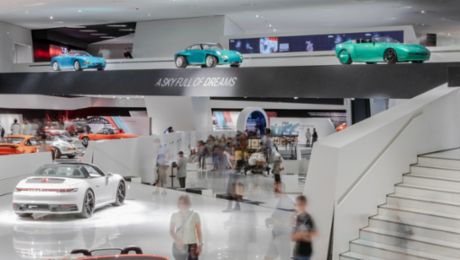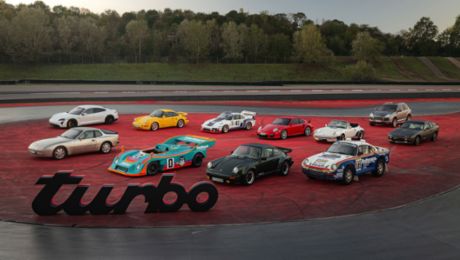While electronic music and mobility come together, visitors can visit three exhibits from Zuffenhausen in the ‘Kohlebunker’ event space. “We see the cars in our collection as contemporary witnesses that tell the company’s story. At the MYLE Festival, our cultural heritage meets the cultural heritage of music,” says Achim Stejskal, Director Heritage and Porsche Museum. “There, where stone walls and glass combine history with modernity, we dare to take new paths.”
At the podium event, Porsche brand ambassador, development and racing driver Jörg Bergmeister will provide insights into the turbo technology that migrated from motorsport to series production in characteristic Porsche fashion.
Impressive Turbo trio in the Kohlebunker
2024 is all about the 50th anniversary of the 911 Turbo. Half a century ago, the Stuttgart sports car manufacturer presented the first 911 Turbo with racing technology. To mark this anniversary, the Porsche Heritage and Museum team is bringing three representatives of Turbo history to Munich: A special exhibition vehicle at the MYLE Festival is the Porsche 956. This vehicle stood out due to what is known as the ground effect. The sports car was developed the 956 for the 24 Hours of Le Mans and the Group C World Championship 1982. While driving, the specially shaped underbody created a vacuum that sucked it towards the road surface. This technology made very high cornering speeds possible. The model’s debut resulted in a 1-2-3 victory at Le Mans. The model being displayed in Bavaria is from 1983 and has an output of 456 kW (620 PS).
The next crowd puller that the sports car manufacturer will be presenting is the Porsche 935 ‘Baby’. The 735 kg racing car from 1977 was given its nickname ‘Baby’ because of its reduced displacement of 1,425 cc. This meant that it was able to take part in the two-litre class at sprint races and – like its big brother in endurance events – take the victory. Jacky Ickx won the one-hour race at the Hockenheimring in the 279 kW (380 PS) sports car with a 51 second margin.
As a further tribute to this year’s ‘50 Years of Porsche Turbo’ anniversary, the museum will be presenting a low-profile Porsche 911 Turbo Cabriolet in Munich. The Porsche repair department offered a low-profile structure for the Turbo-width body for the 1989 model year as an option. Reminiscent of the design of successful racing cars, the conversion included lower front wings with folding headlights from the Porsche 944 and a front spoiler with integrated oil cooler. The power-enhanced low-profile version featured a larger turbocharger and achieved an output of 243 kW (330 PS).
The Porsche Museum staff who are making the MYLE appearance happen
According to the founders Robin Tiburtius, Fabian Steindorf and Lennart Vogt, 42,000 visitors attended the MYLE Festival in 2023. The third staging of the event will take place shortly, but before then interested listeners can listen to episode #21 of the festival podcast. For the episode “Faster than fast: In the Porsche Museum with Frank Jung,” (in German) the MYLE founders visited the director of the company archive in Zuffenhausen. Frank Jung gives them an insight into his daily work, reveals which iconic model he still wants to add to the collection and why he and his team like to tell the history of innovation from the past.





